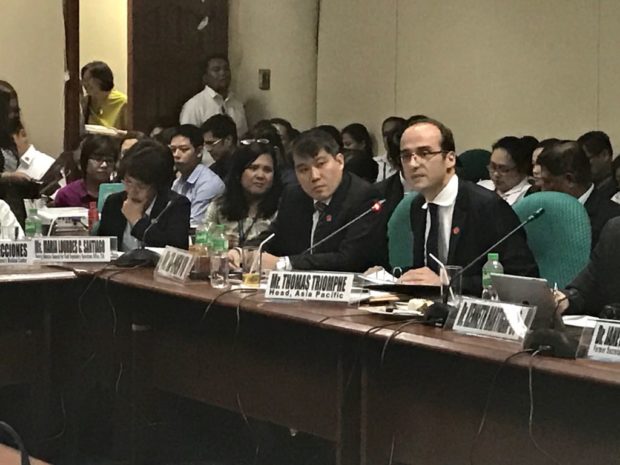Sanofi Pasteur exec: Dengvaxia is ‘a safe and efficacious vaccine’

PHOTO BY PATHRICIA ANN V. ROXAS/INQUIRER.net
An official from Sanofi Pasteur, manufacturer of Dengvaxia dengue vaccine, has denied negligence on the part of the company, saying that permanently removing the vaccine from the Philippine market would be a disservice to Filipinos.
“We have not seen any negligence on the part of the company. But we are willing to cooperate,” Thomas Triomphe, Asia-Pacific head of Sanofi Pasteur, said during the joint hearing of the Senate blue ribbon, health and finance committees on Monday.
“We at Sanofi Pasteur assure each and every one of you that Dengvaxia is, and continues to be, a safe and efficacious vaccine,” he added.
The Sanofi official said Dengvaxia was a result of over 20 years of rigorous research and development involving more than 40,000 individuals in 25 studies across 15 countries.
“Even today, there has been no reported death linked to the vaccine,” Triomphe said.
Last week, the Department of Health (DOH) suspended the administration of Dengvaxia and ordered the close observation of those who had received it after Sanofi disclosed that it “could lead to more severe symptoms for people who had not previously been infected” by the dengue virus.
READ: Citing risks, DOH stops P3.5-B dengue vaccine drive
But Triomphe clarified that Dengvaxia “continues to be effective and safe” despite their study showing it could cause “0.02 percent increased risk of getting traditional Dengue symptoms, such as fever, low platelet count, or nose bleeding.”
“This updated information, which is part of Sanofi Pasteur’s post-licensing monitoring activities conducted as a matter of best scientific practice, shows that seronegative persons have a 0.02 percent increased risk of getting traditional Dengue symptoms, such as fever, low platelet count, or nose bleeding,” he said.
A seronegative person is someone who has not been infected with the dengue virus.
“To permanently remove the vaccine from the Philippine market, on the basis only of the reported 0.02 percent increased risk of getting traditionally known symptoms, would be regression in the country’s approach to solving a major public health concern and a disservice to the Filipino people,” he added.
Earlier, Health Secretary Francisco Duque III aired his frustration over the “mental dishonesty” of Sanofi.
Also attending the hearing were Duque’s predecessors at the Department of Health – Janette Garin and Paulyn Ubial.
/atm